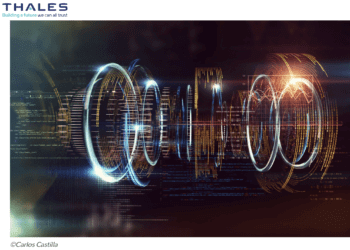Thales has joined the EuroQCI initiative (European Quantum Communication Infrastructure), which aims to deploy a quantum communication infrastructure for EU member states within three years.
By 2040, quantum computers could use their unprecedented computational power to decode encrypted data, incomparably threatening the security of even the best-protected communication systems. EuroQCI aims to counter that threat by developing sovereign systems to protect the communications and data assets of critical infrastructure providers and government institutions.
The longer-term objective is to create a Quantum Information Network (QIN) that will harness the phenomenon of quantum entanglement not only to guarantee communications security but also to create networks of quantum sensors and processors, which have the potential to drive exponential increases in the already outstanding performance of quantum sensors and quantum computers.
As part of this effort, Thales is breaking new ground as a member of multiple new consortia that have been set up since late 2022 in the following fields:
- Quantum repeaters, with the Delft University: QIA (Quantum Internet Alliance) – led by the Delft University of Technology in the Netherlands – is working to demonstrate the feasibility of connecting users in two metropolitan areas 500 km apart, using quantum repeaters, which can compensate for the loss of information via a quantum memory;
- Quantum key distribution: QKISS – coordinated by Exail – and QUARTER – led by LuxQuanta – are developing Quantum Key Distribution systems to protect users' critical communications from cyberattacks.
- Certification of quantum communication: PETRUS – led by Deutsche Telekom – is the official coordinator of 32 EuroQCI projects, on behalf of the European Commission. It is also developing a framework for certification and accreditation of quantum communication products and networks.
- Satellite quantum communications: TeQuantS – led by Thales Alenia Space – aims to develop quantum space-to-Earth communications technologies, necessary for cybersecurity applications and future quantum information networks, through the construction of satellites and optical ground stations by the end of 2026.
Thales notes that it currently operates the largest quantum physics research facilities in Europe, in partnership with the CNRS, and some 100 engineers and researchers are engaged in the development of the quantum solutions (sensors, communications and algorithms).













